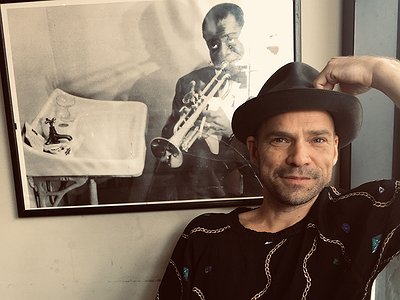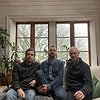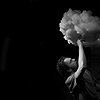Name: Henrik Olsson
Nationality: Swedish
Occupation: Drummer, composer, improviser
Current release: Henrik Olsson teams up with Håvard Volden and Martin Taxt for a new album, Triple Music, of their trio Muddersten, our March 1st 2024 via Sofa. Other new releases include Flyktighetens Psykologi on Thanatosis, as well as Reading Music / Volume 1 via Ausculto Fonogram. There is also a new release with his ensemble GAHLMM (Break a leg on Geiger Grammofon) and with BjörnBergBorg (The black box on Bottna Utropstecken).
Recommendations: I would like to mention two artists (instead of specific artworks) that I find especially influencing right now.
First: British land-artist Andy Goldsworthy for his artistic field work which is not only very beautiful but also spot on when it comes to sustainable means and a truly site specific approach. His practice blurs the boundaries between life and art.
This guy managed to sneak out of the white box a.k.a the art gallery in a way that really inspires me. I am now trying to find a way to sneak my music out of the black box a.k.a. the concert venue.
Second: In 2020 Muddersten had a tour booked in Japan for a collaboration with Japanese alive-painting artist Akiko Nakayama which was cancelled due to the pandemic lockdown. Still we managed to commission a video-score from Akiko that was premiered at the Periferien Festival in 2020 and thats how I got in contact with her work. Her intuitive real-time improvisation with fluid shapes, colors, forms and time gives me a feeling of looking at a visual translation of music. Brief moments of perfection passing by, instantly striking and immediately gone. An almost painful exercise in letting go.
[Read our Martin Taxt interview]
If you enjoyed this Henrik Olsson interview, and would like to find out more about his music, visit his page on the Björn Berg Borg website. He is also on bandcamp.
Do you think that some of your earliest musical experiences planted a seed for your interest in improvisation?
I was not brought up in a so-called musical home so I had my first live music experiences when I moved to a city at sixteen.
But of course sounds in general had a strong impact on me just like everything else does when you’re a kid. Its mainly memories of sounds I heard when being outdoors that come to mind right now, intense sonic moments in nature. Like when I’m standing in the middle of a frozen lake and the ice cracks from one end to the other. It is powerful and scary and I can actually hear the sound move from right to left when the ice breaks, passing underneath my feet.
Or when standing in the middle of a forest on a windy day looking up, surrounded by hundreds of tall fir trees swaying back and forth in the storm and the overwhelming squeaking sound as their wood fibers are bent and stretched to the point of breaking.
In general these kind of sounds are not referred to as music at all but improvisation is, at its best, in the same flexible balance and as wild as the woods.But even so, musicians just organize their sounds the best they can - the feeling of logic and sense happens very much also in the mind of the creative listener.
So I would say, sure the sounds of nature are music whenever someone is there and experiences it as such. Like I did back then, which planted a seed for my interest in listening and later on for improvisation I guess. Nature's revenge is a recurrent theme in my musical work to this day.
When did you first consciously start getting interested in musical improvisation? Which artists, teachers, albums or performances involving prominent use of improvisation captured your imagination in the beginning?
When studying classical percussion playing contemporary notated music back in the mid 90s I channelled quit a lot of musical tension by improvising.
But not so much with the intent to make music perhaps, I was just dragging around furniture, instruments and stuff that would make an interesting sound when being moved, thrown, rolled or tossed over the floor. It was liberating actions with a therapeutic feel to it. At the time it was simply ”poetry as I need it”, to quote Cage.
Cage was, by the way, an early and very important influence for me when approaching the improvised practice which is funny since he himself was not into improvised music at all. It was his mind-set towards silence and the act of listening that inspired me.
Improvising is not mainly about how you play but even more about how you listen.
Tell me about your instrument and/or tools, please. What made you seek it out, what makes it “your” instrument, and what are some of the nost important aspects of playing it?
I play a lot of friction on piezo elements using brushes, sticks, bows etc. But I also generate sounds by attaching contact microphones to objects and different materials such as metal, ceramics, glass, plastic and wood. Over the years I have come to realize that all these sound-sources have found me just as much as I ever found them.
For example, in 2009 I bent a five-foot long thin steel tape into the silhouette shape of a mountain and covered it in tin foil as a backdrop to hide behind since I didn’t like to be seen when performing a solo. After half a year or so the foil fell off and I heard that the steel tape construction made a rich low-frequent sound. I attached a contact microphone to it and voila - what a beautiful booooom!
From that day on I just couldn’t hide behind aluminium foil any more.
How would you describe your own relationship with your instrument – is it an extension of your self/body, a partner and companion, a creative catalyst, a challenge to be overcome, something else entirely?
In general I work with pretty fragile constructions that easily break, unpredictable materials, wobbling objects and shaky balancing acts.
Inconsistency and uncertainty fuel my improvisations and not being in full control makes me a better listener when performing, I think. Using indeterminacy as a strategy brings out the humbleness I need in order to go to new musical places.
Derek Bailey defined improvising as the search for material which is endlessly transformable. What kind of materials have turned to be particularly transformable and stimulating for you?
Haha, yes in my case that would be transformable materials in a very concrete way; tin foil, paper, balloons, steam.
Paradoxes are also stimulating as endlessly transformable ideas; such as amplifying an almost inaudible sound and turn it into a scary loud noise. Or making a cheap, everyday object sound like a million bucks.
Its so nice to find poetry where you least expect it.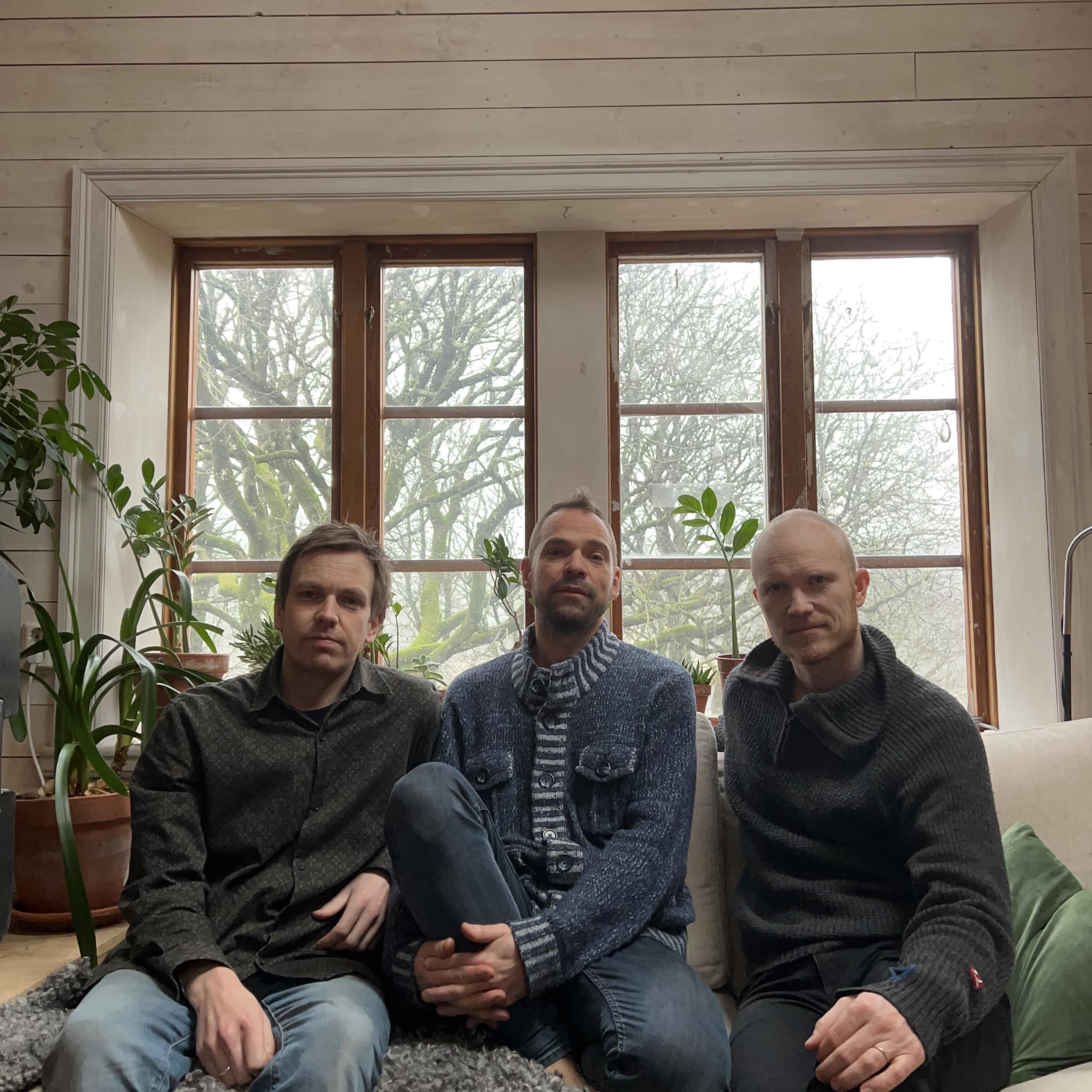
Muddersten Interview Image (c) the artists
Do you feel as though there are at least elements of composition and improvisation which are entirely unique to each? Based on your own work or maybe performances or recordings by other artists, do you feel that there are results which could only have happened through one of them?
I think composition and improvisation are very different, almost like comparing theater with every day life. As an actor the screenplay tells you what to say - scene by scene. Which is great but I wouldn’t like to hang out with friends following a script.
In this analogy, I don't mind to just ”say my lines” if the script is well written but it has very little to do with having an actual conversation.
When writing music for other musicians I usually work out methods where the two disciplines, composing and improvising, somehow meet. I’m trying to find a balance between a notated pre-decided certainty and the uncertain suspense of improvisation.
I sometimes obtain this by incorporating elements of forgetfulness, denial, over compensation and selective memory into the score. My composition Flyktigheten psykologi 1-4 (The Psychology of Transience 1-4) is entirely based on those themes.
When you're improvising, does it actually feel like you're inventing something on the spot – or are you inventively re-arranging patterns from preparations, practise or previous performances? What balance is there between forgetting and remembering in your work?
For me the musical freedom in improvisation resembles the freedom of speech. Just because I have the constitutional right to my own opinion doesn’t mean I want to change my point of view every day.
What we think and feel and find important and funny and morally correct or politically annoying is based on a lifetime of experiences, based on everything we thought of so far. You won't throw that over board just because you can. These values manifests what you are, what you have become up to this point.
But yes, sometimes you find a new angle and stumble into the unknown.
Are you acting out parts of your personality in your improvisations which you couldn't or wouldn't through other musical approaches? If so, which are these? What, would you say, are the key ideas behind your approach to improvisation?
Here. Now.
In terms of your personal expression and the experience of performance, how does playing solo compare to group improvisations?
For me improvising is a conversation. A conversation in the sense that there are other people involved. What I say I say in response to what the others just said, It is based on feedback. But performing solo feels like a monolog to me and I just don’t have that much feedback to give myself on something I just said.
When I perform a solo it is usually based on a concept, method or a composition simply because I’m still very confused about how to execute an improvisation on my own. What I do in my studio should rather be referred to as ”soundsearching”. And I’m not sure I would be comfortable to do that on stage in front of an audience.
In your best improvisations, do you feel a strong sense of personal presence or do you (or your ego) disappear”?
My best improvisations are totally depending on the other musicians/artists but also very much on the audience.
When the timing is right and all the sounds fall into place and makes musical sense to everyone, then I don’t have a strong sense of neither a personal presence, nor have my ego disappeared. Everyone involved owes that moment to each other. It is a kind of collective debt that works as a social bond, you’re just grateful to the others and they are grateful to you. 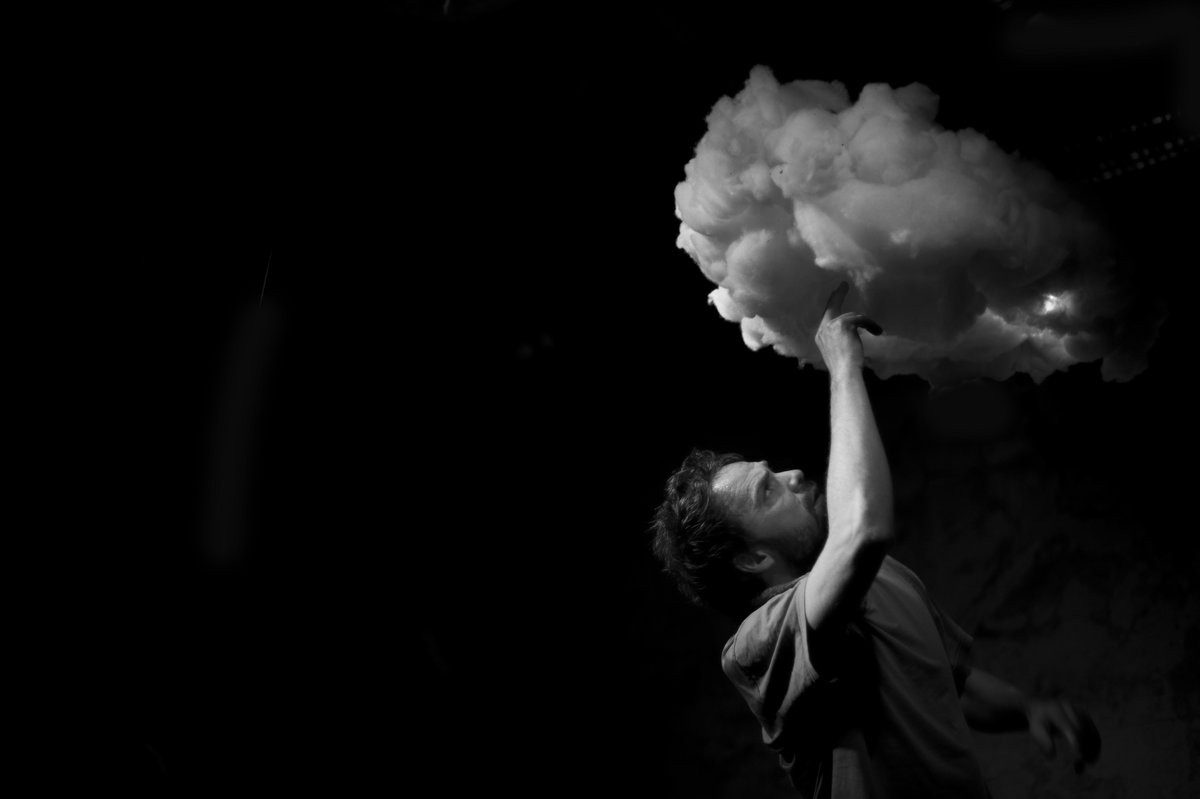
Henrik Olsson Interview Image (c) the artist
In a live situation, decisions between creatives often work without words. From your experience and current projects, what does this process feel like and how does it work?
Like you said, the magic works without words. And only without words.
Strategies, methods, concepts, notes - these things you can talk about for hours but what actually happens between the lines in a live situation is still hard for me to pinpoint.
Stewart Copeland said: “Listening is where the cool stuff comes from. And that listening thing, magically, turns all of your chops into gold.” What do you listen for?
I listen to the silence in-between sounds and then, over time, more or less subconsciously, value my sounds based on the quality of that silence.
There can be surprising moments during improvisations – from one of the performers not playing a single note to another shaking up a quiet section with an outburst of noise. Have you been part of similar situations and how did they impact the performance from your point of view?
What we find is that surprises usually have a rather short expiration date, don’t they? We tend to categorize all information into known and unknown and no surprise at all can sometimes be the most surprising thing.
But on the other hand, there’s no risk we will ever run out of surprises. When we get surprised we wake up to a feeling of ”here” and ”now” and I like when that happens in music, out of pure principle.
I have always been fascinated by the many facets of improvisation but sometimes found it hard to follow them as a listener. Do you have some recommendations for “how to listen” in this regard?
Sometimes people in the audience excuse themselves after a concert for not having been a good listener: ”My thoughts drifted away, making images”, ”I started daydreaming about my summer holidays”, ”I remembered things from my childhood”. Things like that. I say: But that’s wonderful!
Any given moment in life could be considered fascinating. Nature for example is so complex it would blow our minds on a daily basis if we took it all in, but luckily our awareness use filters. The way you listen to music is just as multi faceted as the music itself. So don’t worry about missing out, let your associations lead the way.
Not all moments can pass through the prefrontal cortex.
In a way, improvisations remind us of the transitory nature of life. When an improvisation ends, is it really gone, just like a cup of coffee? Or does it live on in some form?
I like the fact that music ends like a cup of coffee. Sound waves into thin air, that is what makes it so beautiful!
And all is not lost. I re-run memories of strong live musical moments in my mind more often then I listen to the CD with the same band. And even if there were just a handful of people in the audience, all four of them might very well remember it too.
In short, not one single moment is totally passed as long as the ones who shared it remembers it.



